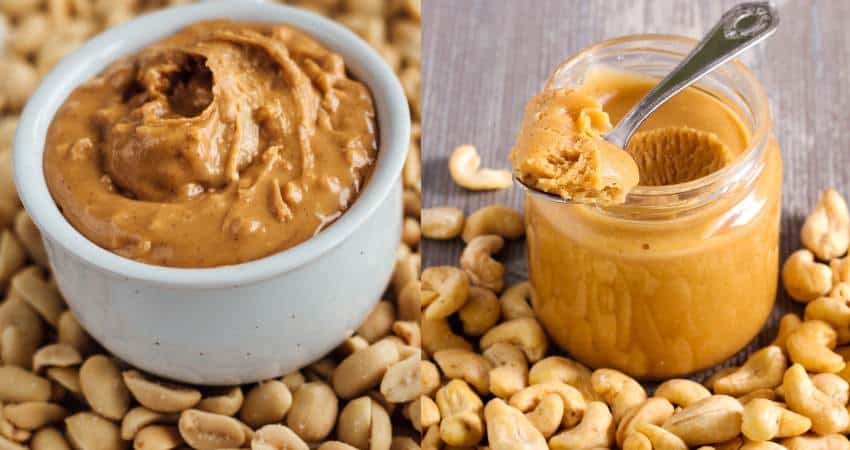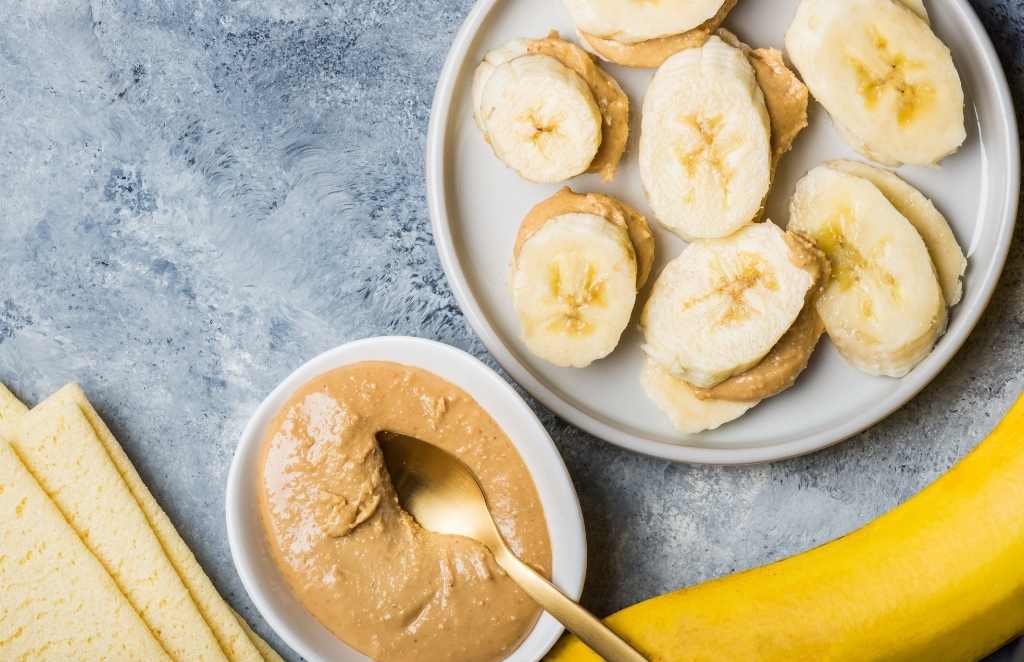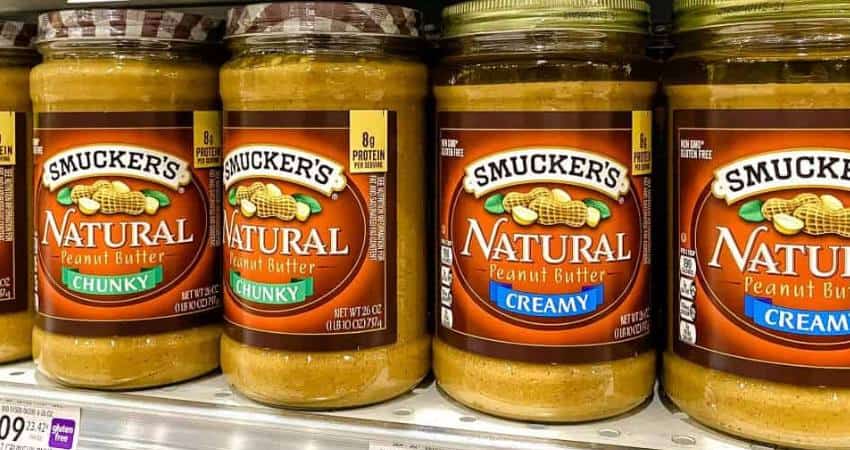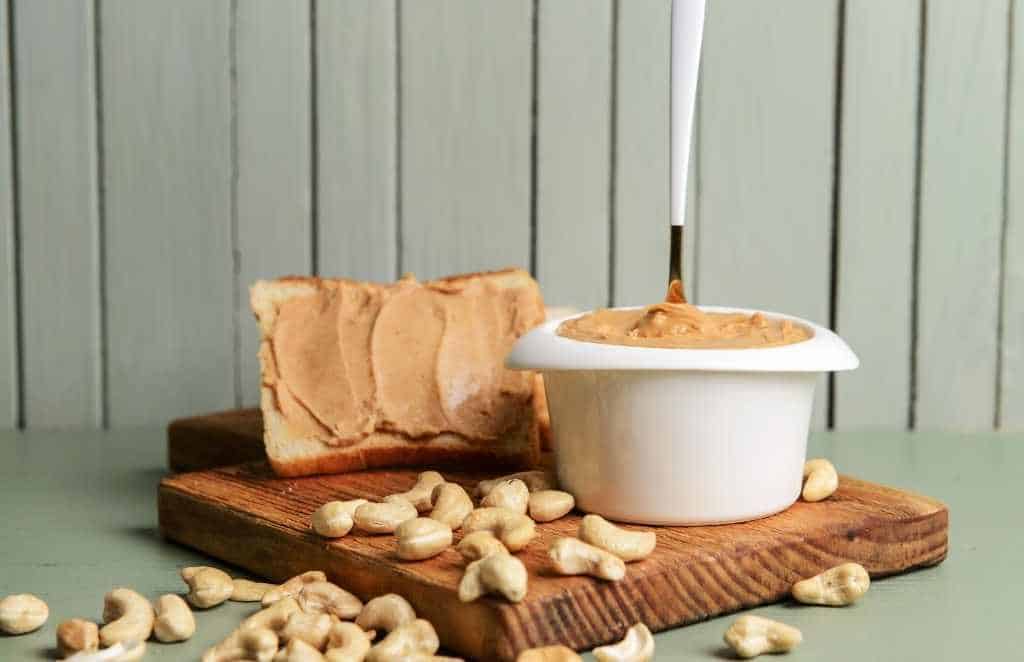Cashew Butter vs Peanut Butter: Which Butter is Better?
As a Certified Health Coach informing clients about nut butters is part of my role. Since cashew and peanut butter provide many nutrients many of my clients wonder if one is better. Let’s answer, which is better, cashew butter or peanut butter?
Peanut butter is better than cashew butter due to its greater percentage of vitamins, fiber, protein and minerals. It also contains fewer carbohydrates, sodium and sugar. It has a better glycemic index than cashew butter which results in smaller blood sugar increases and better digestion.
This article will include a side-by-side comparison of their nutrients. In addition, I’ll compare their pros and cons, tastes, prices, glycemic index, satiety index and health benefits.
I have researched both nut butters for my health coaching job and personal use. I’ve purchased, researched and consumed both prior to, during and after writing this article.
Pros and Cons
For the purpose of this article, I’ll be comparing all natural butter with no added ingredients. Some commercial store bought nut butters contain artificial sweeteners and additives. This takes away from the healthiness.
Always check the ingredient label. There shouldn’t be anything else listed there other than peanuts or cashews.
Peanut Butter Pros and Cons
Here’s a breakdown of the pros and cons:
| Pros | Cons |
| Cheapest nut butter, even when organic. | Many people are allergic to peanuts. |
| Good source of protein. | High-calorie count. |
| Rich in vitamins. | Many brands add oil or sugar. |
| Rich in minerals. | |
| Good source of fiber. | |
| Low glycemic index. | |
| Well liked flavor | |
| Easy to find. |

Cashew Butter Pros and Cons
Here’s a breakdown of the pros and cons:
| Pros | Cons |
| Less likely to contain additives. | More money. |
| Low glycemic index. | Difficult to find. |
| Good source of iron. | Less fiber. |
| Rich in copper. | Less protein. |
| Rich in zinc. | |
| Fewer allergic reactions. |
Cashew Butter and Peanut Butter: Nutritional Analysis
To determine which butter is healthier, we’ll first look at each one’s nutrients. The below table compares the macronutrient, vitamin and mineral content per 100 grams:
| Nutrient | Peanut Butter (per 100g) | Cashew Butter (per 100g) |
| Calories | 594 | 587 |
| Fiber | 9.4 g | 2.0 g |
| Total Fat | 49.9 | 49.4 g |
| Sugar | 3.12 g | 5.91 g |
| Carbohydrates | 21.9 g | 27.6 g |
| Sodium | 5.95 mg | 15 mg |
| Protein | 25 g | 17.6 g |
| Vitamin A | 0 IU | 0 IU |
| Vitamin B1 (Thiamin) | 0.13 mg | 0.31 mg |
| Vitamin B2 (Riboflavin) | 0.19 mg | 0.18 mg |
| Vitamin B3 (Niacin) | 12.5 mg | 1.60 mg |
| Vitamin B5 (Pantothenic Acid) | 0.47 mg | 1.20 mg |
| Vitamin B6 | 0.44 mg | 0.25 mg |
| Vitamin B9 (Folate) | 86 mcg | 68 mcg |
| Vitamin E | 9.1 mg | 0.9 mg |
| Calcium | 62 mg | 43 mg |
| Magnesium | 270 mg | 258 mg |
| Iron | 3.1 mg | 5.03 mg |
| Phosphorous | 481 mg | 457 mg |
| Copper | 0.42 mg | 2.19 mg |
| Potassium | 564 mg | 546 mg |
| Zinc | 2.54 mg | 5.16 mg |
| GI (Glycemic Index) | 14 | 22 |
After checking the nutrients above it’s difficult to determine which one provides more nutritional benefits. Let’s take a closer look and answer the question, which is healthier?
Peanut butter is healthier than cashew butter due to its higher percentage of vitamins, minerals, fiber and protein. It provides more vitamin E, riboflavin, niacin, B6, folate, calcium, magnesium, phosphorus and potassium. Peanut butter has a lower glycemic index.
Cashew butter is healthy also. It contains many of the same healthy nutrients, just in smaller percentages. It provides a higher percentage of thiamin, B5, iron, copper and zinc than peanut butter.
I use peanut butter more often due to its taste, higher percentage of nutrients, fiber and protein.
You cannot go wrong choosing either one. It may come down to your particular goals discussed in the following section.
Nut Butters: Which to Choose
Each butter considered healthy, and you really can’t go wrong choosing either one. Some people will alternate between the two to avoid boredom. In addition, by consuming both, you can take advantage of each ones benefit.
Some people have different goals which may sway your decision, one way or the other. Let’s take a look at the most common goals.
The following video compares the differences between peanut butter and nut butter including cashew.
Weight Loss and Calories
The most popular goal may be weight loss. If you want to shed some extra pounds, you may ask, which one is better for weight loss?
Peanut butter is better for weight loss than cashew butter due to its lower glycemic index, fewer carbohydrates, sugar and more fiber. It has a glycemic index of 14 and cashew 22. This combined with more fiber and protein makes it take longer to digest, causes less sugar spikes and makes you feel full longer.
Both are about equal in terms of the overall fat and calorie content. The two calorie difference between the two isn’t large enough to make a difference when the goal is weight loss.
Both should be consumed in moderation. Cashew and peanut butter are high in calories. The calories in any nut butter add up pretty fast by eating too much.
Including nut butters as part of a well-balanced nutrition plan will help gain the maximum weight loss benefits.
Low-carb or Keto Diet
If your goal is a Keto or low-carb diet then carbohydrates are your number one concern. If you’re on a low-carb diet, you may ask which has more carbohydrates?
Peanut butter is better than cashew butter for a keto or low-carb diet due to its less carbohydrates. It contains 7.01 grams of carbohydrates per 2 tablespoon serving. Cashew butter contains 8.84 grams of carbohydrates per 2 tablespoon serving.
Another consideration for low-carb diets is the amount of fat. Both of them provides approximately 16 grams of fat per 2 tablespoon servings.
Bodybuilding
If your goal is to gain lean muscle mass there’s a good chance you’re lifting weights at home or in the gym. Which butter is better for bodybuilding?
Peanut butter has significantly more protein per serving making it better for bodybuilding. Peanut butter provides 2.4 grams more per two tablespoons than cashew.
I often eat all natural peanut butter a few days a week, especially on days I go to the gym. It’s a great snack and a great way to add protein and calories on training days.
Supplements for bodybuilding are expensive, and the costs add up pretty fast. Considering the price of both, cashew cost much more than peanut butter. The difference in price supports making it the better choice for bodybuilding.
For more details about the prices check out the next section below.

Cashew Butter and Peanut Butter: How Much Do They Cost?
It seems every trip to the supermarket lately results in a higher price at checkout. Not only that but it seems I have less groceries in my shopping cart.
If you’re looking to save money, the cost of food certainly matters to most people. The price may sway your decision about which one to buy as a snack option. Therefore, which butter costs more?
Compared to peanut butter, cashew butter cost 350% more per serving. The average price for cashew butter is $1.12 per 2 tablespoon serving. The average price for peanut butter is $0.25 per 2 tablespoon serving.
The prices for both foods vary depending on the store, location and sales offered. Therefore, to conduct original research, I searched various different stores to compare the price of both.
I first visited the Shoprite supermarket for the prices of each one:
- Natural peanut butter (Smuckers brand)
- $3.39 per 16 oz jar (14 servings) equaling $0.24 per 2 tablespoon serving
I then checked Walmart and found both of them:
- Natural peanut butter (Smuckers brand)
- $3.64 per 16 oz jar (14 servings) equaling $0.26 per 2 tablespoon serving.
- Natural cashew butter (Artisana brand)
- $13.99 per 14 oz jar (12 servings) equaling $1.16 per 2 tablespoon serving.
- Natural cashew (Spread The Love Brand)
- $14.99 per 16 oz jar (14 servings) equaling $1.07 per 2 tablespoon serving.
To save even more money, consider making some on your own. It’s very easy, and all you need is the cashews/nuts and a powerful blender like a Vitamix.
I’ve made nut butter at home with my Vitamix blender in less than one minute. Check out my blender review here, Vitamix Venturist V1200 Review.
Also, check out this video below by Vitamix which explains how to make peanut butter at home.
Nut Butters: Taste and Texture
If the health benefits or the price doesn’t sway you one way or the other, you may need something extra to swing the balance. In this case, taste may be the deciding factor. Therefore, which one has the better taste?
Cashew butter has a milder taste than the sweeter peanut butter. Both nut butters have a nutty taste, but peanut butter is nuttier and earthier. Cashew butter is less overpowering than peanut butter. Both of them can be creamy or thicker depending on how they are processed.
Cashew butter doesn’t taste like butter. It tastes nutty and mild. The slightly sweet cashew is creamier than peanut and almond butters.
To conduct some original research and get the opinions of real people like you, I decided to poll my clients, readers and people in food groups I belong to. I asked them which one do they prefer?
- 59% said they preferred the taste of peanut butter.
- 31% said they preferred the taste of cashew butter.
- 10% said they had no preference.
I thought it would be fun setting up a blind taste test at home. Each participant, including myself, tasted a sample of each one on a teaspoon. 75% of us picked the peanut butter.
In the battle of taste it was the winner in my blind taste test and in the poll.
Substitutions
There may be times you want to use one instead of the other. This may be due to personal preference, or you only have one type available.
In this situation, can you use one or the other?
Cashew butter can substitute for peanut butter in most recipes. Both can substitute for each other using equal amounts of each. Cashew butter will have a milder flavor. They both can be used as spreads or in smoothies, sauces, curries or baking.
Cashew butter ideas:
- Can be used as a substitute for cream cheese.
- It can mixed with oat milk and added to overnight oatmeal.
- Use it as a base for grain-free bread.
Peanut butter ideas:
- Add some to a banana.
- Spread some on an apple.
- Add some to any smoothie.
- Add it and oatmeal to a smoothie.
( The video below shows you how to make cashew butter using a blender )
Store bought nut butter tip: To mix the oil at the top into the nut butter, I microwave it which loosens it up and makes it easier to mix. Once mixed I refrigerate it preventing the oil from rising back to the top again. It will remain mixed together.
Cashew Butter vs Peanut Butter: Glycemic Index
The Glycemic Index (GI) is a scale measuring how fast a particular food raises the blood sugar in the blood4. Blood sugar spikes can lead to health complications with the heart, nerves, kidneys and eyes.
The glycemic index of food is important. Avoiding blood sugar spikes is an important part of consuming healthy food. This is true for diabetics or anyone worrying about their health.
Foods on the GI scale are categorized as:
- Low-GI foods: 55 or under
- Medium-GI foods: 56-69
- High-GI foods: 70 or over
How blood sugars levels are affected:
- Foods with a glycemic index 70 or more cause a quicker spike in blood sugar levels.
- Foods with a glycemic index 56 to 69 cause a moderate spike in blood sugar levels.
- Foods with a glycemic index 55 or less cause a slow spike in blood sugar levels.
Now we know what the glycemic index of food is and how it raises blood sugar, many people ask, which one has a higher glycemic index?
Peanut butter has a lower glycemic index than cashew butter although both are considered low glycemic foods. Peanut butter has a glycemic index of 14, and cashew has a glycemic index of 22.
Find out how pistachios compared in my article, Pistachios vs Almonds: Which is Better? Let’s Compare.
Cashew Butter and Peanut Butter: Satiety Index
Satiety is a term used to explain the loss of appetite and the feeling of being full after eating food. The satiety index is a scale showing how full a person feels after eating certain foods.
The satiety index was developed in 1995 from a study. The researchers tested 38 foods which were ranked how they satisfied a person’s hunger. Foods scoring above 100 are considered more filling and foods scoring under 100 are considered less filling5.
The table below shows the satiety scores of some foods noted in the study.
| Snack | Satiety Index Score |
| Mars candy bar | 70% |
| Peanuts | 84% |
| Bananas | 118% |
| Brown Rice | 132% |
| Lentils | 133% |
| Eggs | 150% |
| Popcorn | 154% |
| Oatmeal | 209% |
| Boiled potatoes | 323% |
Unfortunately, they didn’t test nut butter. Even though other studies have determined peanut butter is good for satiety.
Purdue University published a study testing the satiety of peanut butter and peanuts against a non peanut meal. It resulted in the lowest desire to eat cravings than peanuts or the non peanut meal.
It enhanced gut satiety hormone secretion and reduced the desire to eat the best of all three food options6.
A study released recently found tree nuts, like cashews, does not stimulate weight gain even though they contain a good amount of calories. The researchers noted the ingestion of nuts can help in the control of satiety7.
High satiety food is likely to have a high satiety score for the following reasons:
- High in protein.
- High in fiber.
- High in volume (foods containing a lot of water or air).
- Low in energy density (foods low in calories for their weight).
Both of the foods compared in this article are high in protein, fiber and weight satisfying three of the four reasons above.
Check out how peanuts in my article, Peanuts vs Almonds: Which is Healthier? Let’s Compare.

Health Benefits of Each Butter
The similar nutrients contained in both offer the same type of benefits. One of them may help some of these benefits more if the percentage is higher.
The following describes how each nutrient may benefit health and how much more each one provides than the other.
Minerals
Peanut butter has a higher percentage of minerals than cashew. Let’s take a closer look at some of these minerals and how they benefit health.
Potassium
Peanut butter provides 3.4% more potassium per 100 grams.
Some medical experts recommend the potassium to sodium ratio of 4:1. Consuming too much sodium or not enough potassium throws off the delicate balance the kidneys need to remove the excess water8.
Potassium helps the body get rid of excess sodium reducing fluid build-up. These help keep systolic and diastolic blood pressure lower ((American Heart Association: How Potassium Can Help Control High Blood Pressure)).
According to Harvard Health, a number of studies have shown a connection between low potassium levels and high blood pressure9. The more potassium, the more sodium your body will lose.
Magnesium
Magnesium helps keep blood pressure levels stable and balanced. Recent scientific research examined previous studies and concluded magnesium supplementation decreased systolic and diastolic blood pressure10.
Magnesium helps control the following:
- Blood sugar
- Nerve function
- Insomnia
- Muscle
- Blood pressure
In the heart and muscles, magnesium competes with calcium to help the muscles relax after contracting. When the body is low in magnesium, calcium can over stimulate the heart muscle’s cells causing a rapid or irregular heartbeat11.
One reason many people supplement with magnesium in the evening is because it helps calm the whole body including blood vessels.

Calcium
Calcium is important for the heart and blood pressure. Harvard Health reports calcium helps maintain blood pressure by helping in the controlling of the relaxing and tightening of blood vessels12.
Calcium also helps the following:
- Helps nerve function.
- Maintain and build strong bones.
- Help the muscles to function properly.
Iron
Cashew butter provides more.
Iron is essential in the creation of red blood cells and is a necessary part of any healthy diet. Iron is also vital for growth and development, as some hormones need iron to be appropriately balanced13.
Phosphorus
Phosphorus has been shown in scientific studies to help with the following:
- Promote healthy nerve conduction.
- Promote bone and teeth strength.
- Muscle contraction.
- Muscle recovery.
- Help the kidneys remove waste.
- Help the body manage and store energy.
Macros & Fiber
Dietary Fiber
Peanut butter provides 360% more fiber per 100 grams.
Soluble fiber is helpful for many reasons ((National Center for Biotechnology Information: Mechanisms linking dietary fiber, gut microbiota and colon cancer prevention)). What makes fiber soluble is it dissolves in water.
Soluble fiber is known for the following:
- Manage the blood glucose levels which helps decrease the risk of diabetes.
- Helps avoid constipation and have a more regular stool.
- Help overall digestive health.
- Aids greatly in weight management because it allows you to feel full faster and eat less.
Protein
Both nuts are a good source of protein. Protein may help benefit the following:
- Reduce appetite
- Build and repair muscle
- Boost metabolism
- Weight loss

Vitamins
Vitamin E
Vitamin E has powerful antioxidant effects. It helps protect cells from oxidative stress by neutralizing the harmful free radicals14.
Vitamin E is needed for proper immune function.
- Helps to reduce the markers of oxidative stress.
- May reduce heart disease.
- May benefit skin health.
- May improve immune function.
- Helps to fight inflammation.
B Vitamins
The B vitamins provided include the following:
- B1 (thiamin)
- B2 (riboflavin)
- B3 (niacin)
- B5
- B6
- B9 (folate)
B vitamins help support the following:
- Brain function.
- Red blood cells.
- Digestion.
- Nerve function.
- Cardiovascular disease.
- Energy levels.
A lack of B vitamins has been associated with oxidative stress and neural inflammation.
In a study released in 2018 32 healthy adults were given B vitamin supplementation for six months. The results indicated preliminary evidence B vitamin supplementation reduced oxidative stress and inflammation15.
Saturated Fat
Peanut and cashew butter has a high dose of healthy fats. The presence of saturated fat doesn’t make a food automatically unhealthy. It’s the whole package of nutrients making a difference.
Even though, nut butter peanut only contains 3.3 grams of saturated fat per 2 tablespoons. 12.3 grams is unsaturated fat, making saturated account for only about 20% of total fat.
Saturated fat is not a negative concern with natural, healthy nut butters.
If you have any questions about this article don’t hesitate to email us. You can find an email on our contact page.
Read Next – More Butter and Food Articles!
Cashews vs Almonds: Which is Better? Let’s Compare
Legumes vs Nuts: The Differences
Chia Seeds vs Hemp Seeds: Which Is Better?
Wheat Germ vs Wheat Bran: What’s The Difference?
Ground Flaxseed vs Flaxseed Meal: The Differences
- USDA: Nuts, cashew butter, plain, without salt added [↩]
- USDA: Natural Peanut Butter [↩]
- USDA: All Natural Peanut Butter [↩]
- Harvard Health Publishing: Glycemic index for 60+ foods [↩]
- National Center for Biotechnology Information: A satiety index of common foods [↩]
- Purdue University: Acute and Second Meal Effects of Peanuts on Glycemic Response and Appetite in Obese Women with High Type 2 Diabetes Risk: A Randomized Crossover Clinical Trial [↩]
- National Center for Biotechnology Information: Nuts and Human Health Outcomes: A Systematic Review [↩]
- National Center for Biotechnology Information: The Effect of the Sodium to Potassium Ratio on Hypertension Prevalence: A Propensity Score Matching Approach [↩]
- Harvard Health: Potassium lowers blood pressure [↩]
- National Center for Biotechnology Information: Effect of magnesium supplementation on blood pressure: a meta-analysis [↩]
- National Institutes of Health: Magnesium [↩]
- Harvard Health: Key minerals to help control blood pressure [↩]
- National Institutes of Health: Iron [↩]
- National Center for Biotechnology Information: Effects of High-dose Vitamin E Supplementation on Markers of Cardiometabolic Risk and Oxidative Stress in Patients with Diabetic Nephropathy: a Randomized Double-blinded Controlled Trial [↩]
- National Center for Biotechnology Information: The Effect of a High-Dose Vitamin B Multivitamin Supplement on the Relationship between Brain Metabolism and Blood Biomarkers of Oxidative Stress: A Randomized Control Trial [↩]
